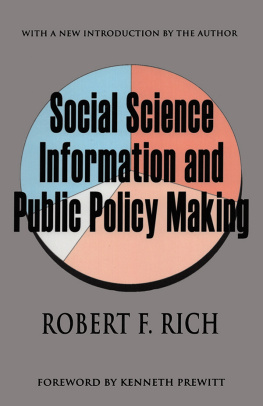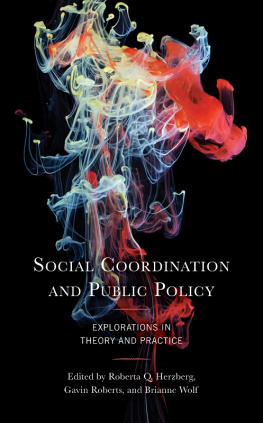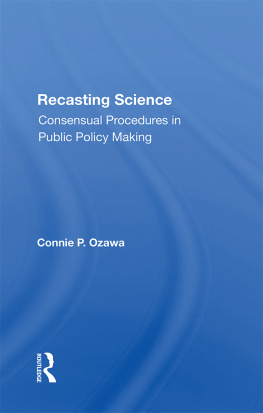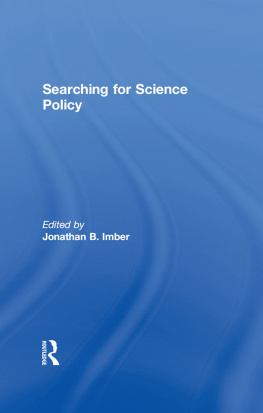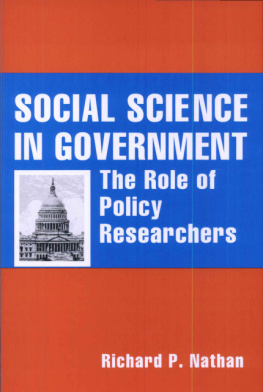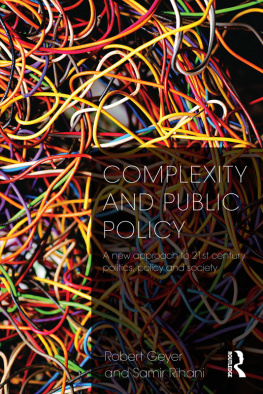Social Science Information and Public Policy Making
Social Science Information and Public Policy Making
ROBERT F. RICH
WITH A NEW INTRODUCTION BY THE AUTHOR
FOREWORD BY KENNETH PREWITT
Originally published in 1981 by Jossey-Bass Inc., Publishers.
Published 2001 by Transaction Publishers
Published 2017 by Routledge
2 Park Square, Milton Park, Abingdon, Oxon OX14 4RN
711 Third Avenue, New York, NY 10017, USA
Routledge is an imprint of the Taylor & Francis Group, an informa business
New material this edition copyright 2001 by Taylor & Francis.
All rights reserved. No part of this book may be reprinted or reproduced or utilised in any form or by any electronic, mechanical, or other means, now known or hereafter invented, including photocopying and recording, or in any information storage or retrieval system, without permission in writing from the publishers.
Notice:
Product or corporate names may be trademarks or registered trademarks, and are used only for identification and explanation without intent to infringe.
Library of Congress Catalog Number: 00-051202
Library of Congress Cataloging-in-Publication Data
Rich, Robert F.
Social science information and public policy making / Robert F. Rich; with a new introduction by the author,
p.cm.
Originally published: San Francisco: Jossey-Bass, 1981.
Includes bibliographical references and index.
ISBN: 0-7658-0758-0 (pbk.: alk. paper)
1. Social sciencesResearchUnited States. 2. United StatesSocial policy. 3. Social surveysUnited States. 4. BureaucracyUnited States. 5. Policy sciences. I. Title.
H62.5.U5 R52 2000
300'.723dc21
00-051202
ISBN 13: 978-0-7658-0758-8 (pbk)
To Lucy, for all her love and encouragement over time.
Contents
by Kenneth Prewitt
Since this book was first published in 1981, scholars from many different disciplines have been involved with researchtheoretical and empiricalon some aspect of knowledge production, acquisition, dissemination, utilization, and application to organizational and individual problem-solving processes. Affected disciplines include business administration, communications, economics, management information systems, marketing, medicine, organizational studies, philosophy, political science, psychology, public health, and sociology. It is also generally believed that knowledge and information drive the economy of the globe. The development of the World Wide Web and information technology has provided a basis for a truly global information infrastructure (Birnbaum 1999).
One research issues which has received considerable attention is information overload (including strategies for dealing with overload problems, access to information, the processing of information) by individuals and organizations, including questions of processing errors, biases, and information symmetries and asymmetries. Other important research issues include the management of information, the impacts of information technology (including e-mail and the world wide web), the integral role of information in rational decision-making processes, the role of information in organizational learning and developing organizational intelligence capacity, the political role of information in the public policy-making process (including the increasing importance which has been attached to public opinion data), the information or knowledge economy, and the use and abuse of information.by individuals and organizations. The role of information in decision-makingindividual and organizationalhas been given increased attention in social science literature. Yet, decision-making occurs in an organizational or institutional context, a fact which is central to our understanding of what the role of information actually is.
As valuable as information is, information by itself is meaningless. Information only takes on meaning in the context of the social practices of the communities that give it life... Why is it, then, that we always think of learning in individualistic terms of acquisition of information... (Wenger 1991).
Looking at this body of literature which consists of empirical research, testimonials, and think-pieces, one quickly arrives at the conclusion that most past studies lack a comprehensive conceptual framework which addresses critical issues associated with various stages of what might be called the knowledge cycle (Rich 1981b). Researchers have tended to focus on one aspect or stage of knowledge processing in decision-making with little consideration of the interrelated stages. While each stage of knowledge processing can be studied as a distinctive agenda for research, it is important to analyze how the stages are interrelated and what the critical issues are for each component of the cycle. There are several distinct stages in the process of obtaining and using information for decision-making; these may be referred to as the cycle of information processing (see ).
We use the term cycle to suggest that information use is not a discrete event in isolation; instead, it is one stage in an interrelated set of stages or phases (Rich 1981b; van Lohuizen 1986; Wingens 1990). The information search phase (or the information acquisition stage) is understood as a task in which a decision-maker seeks information about problems or policy issues on his or her agenda. Message and channel implicitly represent the dissemination phase of information processing in organizational decision-making. Message means characteristics associated with information (e.g., types or content of information), and channel implies the way in which information can be flowed to decision-makers: formally (organizational structure) or informally (interpersonal communications). Once information is received and processed, it may or may not be used completely or incompletely by decision-makers. Use is implicitly a choice or decision about whether or not to apply information in a decision-makers work. Since the logic of each stage may be different, one cannot assume that one stage leads automatically to the next. This is not necessarily a linear process. The fact that information is acquired does not necessarily mean that information will be disseminated and/or used. Similarly, the fact that information is used does not necessarily mean that it will have an impact on an ultimate decision.
Figure 1. A Cycle Model of Information Processing
Types of Information/Knowledge and Use
The knowledge cycle provides a context in which to consider the role of information in decision-making. Decision-makers employ a knowledge inquiry system which encompasses some or all of the stages in the knowledge cycle. The nature and scope of this inquiry system may vary by individual or by the organizational/ institutional context in which he or she operates. The analysis of an individual inquiry system may also be sharpened by distinguishing between types of information and knowledge as they enter into the decision-making process.





